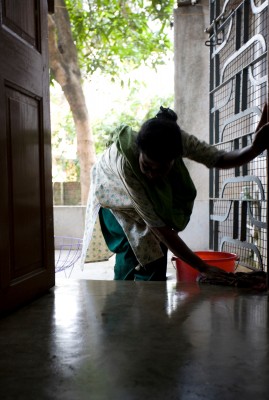They clean and cook and sew and care for children. Their numbers are growing, and many of them have little legal protection. Many are slaves.
The dramatic growth in number of people working as domestic servants is documented in a report released today by the International Labor Organization (ILO), a branch of the United Nations. Researchers say the number of domestic workers has jumped by 19 million worldwide since the 1990s, and now stands at approximately 52 million. The ILO says 83 percent of them are women.
“Domestic workers are frequently expected to work longer hours than other workers and in many countries do not have the same rights to weekly rest that are enjoyed by other workers,” says ILO Deputy Director-General Sandra Polaski. “Combined with the lack of rights, the extreme dependency on an employer and the isolated and unprotected nature of domestic work can render them vulnerable to exploitation and abuse,” she said.

A domestic worker in India | Photo: Kay Chernush for Free the Slaves
Not all domestic workers are slaves. But the growing demand for household help, and increasing migration by women from impoverished rural areas to wealthier cities and countries, is causing a situation where trafficking and enslavement is more likely to occur.
“The precarious legal status of migrant domestic workers and their lack of knowledge of the local language and laws, make them especially vulnerable to abusive practices, such as physical and sexual violence, psychological abuse, non-payment of wages, debt bondage and abusive living and working conditions,” the ILO says.
Today’s report is called Domestic workers across the world: Global and regional statistics and the extent of legal protection.
It follows the June 2011 adoption of a new ILO Convention and Recommendation on domestic work.
Free the Slaves is working in several countries to confront various forms of domestic slavery.
You can read about our program to reduce child domestic slavery in Haiti here.
You can watch our documentary about undercover efforts in India to unmask traffickers posing as domestic labor recruiters, Fighting Domestic Slavery.
You can also watch our documentary about migrants who’ve come to the U.S. looking to work as domestic servants, Dreams Die Hard.
